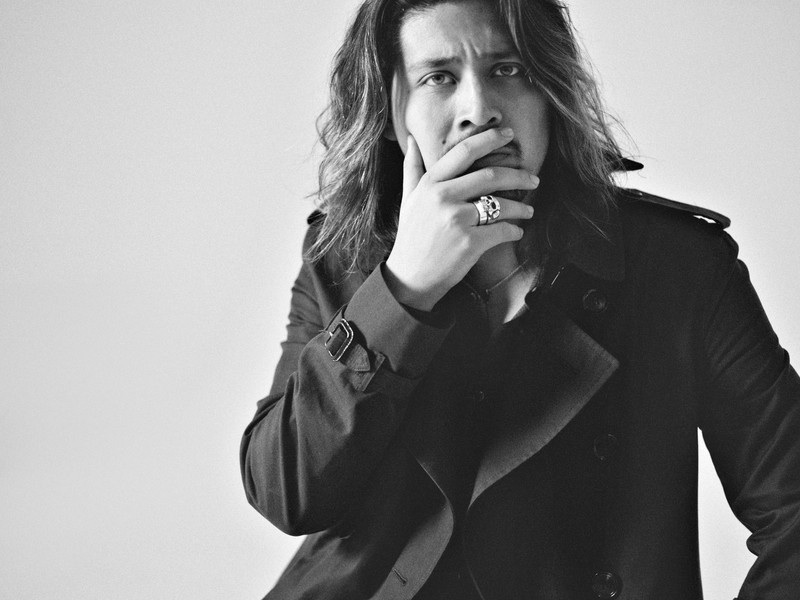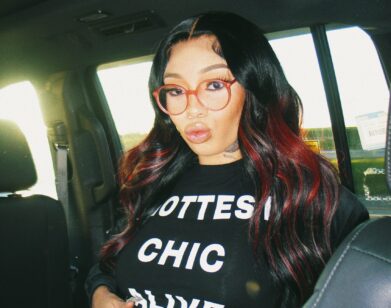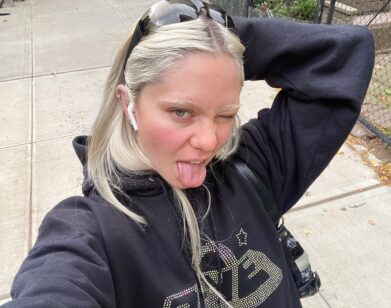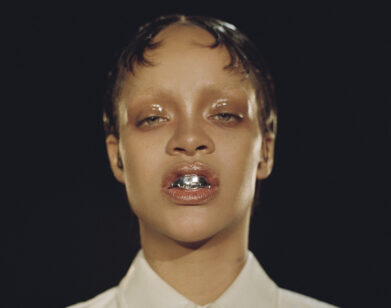Exclusive Song Premiere and Interview: ‘Ballade de Melody Nelson,’ Lulu Gainsbourg feat. Johnny Depp and Vanessa Paradis

ABOVE: LULU GAINSBOURG AT SUN STUDIOS IN NEW YORK. PHOTO BY CHRISTOPHER GABELLO.
If you Google the name Lulu Gainsbourg, you will find a video of the musician’s stage debut. Not quite two years old, the scion of a French legend looks rather terrified as his father beckons him on stage in front of thousands of fans. Now 26, Serge Gainsbourg’s youngest child is releasing his first album, From Gainsbourg to Lulu, a collection of covers of his father’s songs. Lulu, whose real name is Lucien, spent four years at Berklee College of Music in Boston and began playing the piano when he was only four. He is clearly talented, more than just a “son of.” An album of covers seems an odd choice for someone who wishes to escape his family name and prove himself a musician in his own right, but it is not about how it seems. As Lulu explains to us, “I never had the chance to make a gift for him, when he passed away, I was five. This is my gift.”
We imagine Serge would be rather flattered with the famous names Lulu signed up to reinterpret his songs—Scarlett Johansson sings Brigitte Bardot’s part, translated into English, on “Bonnie and Clyde;” Iggy Pop grumbles the ode to Bardot “Initials BB;” and the Pogues’ Shane MacGowan adds his hoarse vocals to “Sous le Soleil Exactement.”
We recently met Lulu in New York—his home and ours—to talk about his father’s legacy, branching out into film, and why he has no plans to go back to France. We’re excited to debut Lulu’s song “Ballade de Melody Nelson,” which features his longtime friend Johnny Depp and Depp’s former partner Vanessa Paradis.

EMMA BROWN: Your album has already gone gold in France. Does that reassure you about how successful it will be in the US, or do you think it’s a completely different of market?
LULU GAINSBOURG: I would say it’s a different market. I know French people can have a really special attachment to my father because to them, he became an icon. My intention, actually, was to a specific target, which was basically outside of France. The goal, why I did this album, first it’s a gift for my father, but I also wanted to [interest] people who don’t know who my father was and to make it easier for him to be discovered by a new generation. That is why I picked some great, high-profile artists [to collaborate with].
BROWN: When did you realize that your father had an unusual job?
GAINSBORG: I realized how huge he was—and he is still—when I started working on this album, actually. ‘Cause to me, he has always been—and he will always be—a father [rather than] an icon. But, for example, when I went to see all these great artists like Scarlett [Johansson], Rufus [Wainwright], Iggy Pop, they all knew who my father was. For me, outside France, I thought, Maybe there is a little chance that they know, and they were all like, “You’re crazy! He’s huge everywhere.” So I was a bit surprised—impressed—with how big he became over the years, because it’s been 22 years [since he died].
BROWN: You’ve known Johnny Depp since you were 12, and Depp and Vanessa Paradis provide the vocals for “Ballade de Melody Nelson.” How did you first meet Johnny?
GAINSBOURG: He asked to meet my Mom and me because he was, and still is, a huge fan of my father’s work. When I met him, I had no idea who he was—he was just a man, just a guy. I was tired, I was asleep. Over time, I discovered who was Johnny Depp and he became my favorite actor before I found out that he was that guy that I met years ago. But he’s become someone really close to me. Someone I really care deeply for, like a big brother. I didn’t have the chance to have any brothers. I met him again about five years ago. He’s a great friend. He’s one of the first friends I’ve been talking about this album with.
BROWN: He plays the guitar right?
GAINSBOURG: Yeah, he plays more then the guitar, he plays the bass, drums—he’s a complete musician.
BROWN: Did you know Scarlett or Rufus or any of the other artists?
GAINSBOURG: Not at all. I decided I didn’t have anything to lose so I wrote to the managers to explain my project and then I got lucky.
BROWN: Did everyone say yes?
GAINSBOURG: No, of course not. But I’m really glad with who I have right now.
BROWN: I can see why you wanted Scarlett to cover Brigitte Bardot’s part in “Bonnie and Clyde,” but what made you pick Iggy Pop for “Initials BB”?
GAINSBOURG: Well, “BB” was originally chosen by Bono from U2, but at last minute, he couldn’t, he had other projects. I’d been producing the song in a rock mode and when he couldn’t do it the music was [already] done. Iggy Pop was working [on] another project [where] he did covers in French of French songs, and he did a cover of [Serge Gainsbourg’s song] “La Javanaise.” He asked me to do the strings on [“La Javanaise”] so, at the same time, I said, “I’ve got a song and no one is on it so far. What do you think?” And he said, “I’ll listen to it,” and the next day he came in and said, “Yeah, I’ll do it, no problem.”
BROWN: Does he speak French?
GAINSBOURG: Yeah, he does. I think so. He’s the only one I haven’t met yet. I’ve been producing all of the other artists myself in the studio, but he’s the only one who did his vocals on his own in Miami while I was working on the other songs.
BROWN: What about Shane MacGowan?
GAINSBOURG: He doesn’t. He barely speaks English. [laughs] He lost all his teeth. He’s such a sweet guy. That was a hard time for me as a producer, it was hard to make it happen, but he did a great job.
BROWN: Is it weird watching movies starring someone like Brigitte Bardot because you know that your dad dated her?
GAINSBOURG: No, I mean I’m impressed,”Wow, this guy dated that girl—one of the most beautiful girls of the time.”
BROWN: Were you worried about releasing an album with your father’s songs because then people would pigeonhole you?
GAINSBOURG: Of course. I had a lot of pressure about that. First of all, I didn’t want to do anything with music because of my dad. A friend helped me to focus on one thing: “Do this for your father, not for the people.” The plan wasn’t to do just covers of my father by myself—that doesn’t make sense to me. What I did is I rearranged all of the music to make it eclectic like my dad’s career [and] I’ve been working with a lot of great artists and people who he worked with. At some point I put all the pressure on the side because I never had the chance to make a gift for him, when he passed away, I was five. This is my gift.
BROWN: Do you feel closer to him now?
GAINSBOURG: Not closer, but something inside me has been relieved—that was important. I’m going to do my own stuff, but for me it was important to go through this door first. Everybody wants to know what’s going on between me and my father and hopefully they can move on and I can become an artist myself.
BROWN: Would you ever move back to France?
GAINSBOURG: Not at all. I don’t feel at home anymore over there. I’m grateful that I can afford to live in New York because when you’re a musician, you can live wherever you want. I just got a visa. Right now, I feel home in New York. Hopefully one day I’ll become a world artist so I can tour and I can do my stuff all around.
BROWN: Do you remember the first song you ever wrote?
GAINSBOURG: It’s a song that I wrote for my ex-girlfriend. I was 16, 17. She broke up with me, and I wrote a song with a friend that explained, “I want you back.” She came back before hearing the song, actually. Then she got to hear the song and she loved it. That was the first one.
BROWN: You started playing the piano when you were four; do you think that is too young?
GAINSBOURG: It’s young, but Mozart was already playing violin in front of the king at three or at five. I wasn’t able to do that at five, I was just [makes banging noise] because I was a baby. I know that I had a good ear, because when my dad passed away I spent the day at the piano, because he used to play me a lot of Disney songs, and I found all the songs by ear.
BROWN: You were in a movie when you were a teenager, would you ever act again?
GAINSBOURG: Yeah, hopefully. I was scared a little bit when I was a kid. The first movie I did, I was 15. Then someone sent me a script, to do the main character, and I was like, “Wow, great.” I was really into the story. Then, when I went to the audition, I had to tell my feelings to a girl, say “I’m in love with you” whatever. But in front of me I had this ugly man with a huge beard and glasses, and I was like, “Sorry, I can’t do this” and left. I went to my mom and I was like, “Okay, I’m done, I’m back to school.” But, now I’m a little bit more mature. I may be able to do something in the movies though, sooner then I think.
BROWN: What do you do when you want to undo the ordinary?
GAINSBOURG: I cannot create, I cannot live without music. I listen to music every day. What do I do to escape? I listen to music. I love classical music, because this is, for me, one of the only [genres] that is relaxing. The classical with the symphonies is relaxing; but the nouveau, the rock, it will stress you out.
BROWN: I heard that you would like to score films. Do you have a favorite film score?
GAINSBOURG: It’s hard to pick one. I’m a huge fan of John Williams—all of the Indiana Jones [music]—Danny Elfman, a crazy man, Hans Zimmer, all of those guys. And at the time they were hand-writing [their music], which is even more impressive. Now you can play with the computer.
FROM GAINSBOURG TO LULU COMES OUT NEXT TUESDAY, OCTOBER 30. FOR MORE INFORMATION, VISIT HIS FACEBOOK PAGE.






